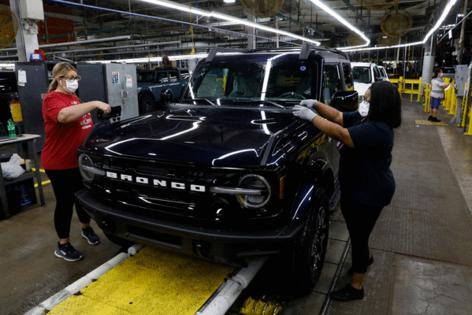Trump has deal to ease auto tariffs, US commerce secretary says
Published in Business News
President Donald Trump has brokered a deal to soften auto tariffs ahead of the president's visit to Michigan on Tuesday, U.S. Commerce Secretary Howard Lutnick said Monday.
“President Trump is building an important partnership with both the domestic automakers and our great American workers," Lutnick said in a statement sent by the White House. "This deal is a major victory for the president’s trade policy by rewarding companies who manufacture domestically, while providing runway to manufacturers who have expressed their commitment to invest in America and expand their domestic manufacturing.”
Details weren't disclosed, but the confirmation of a deal first reported by the Wall Street Journal comes ahead of a rally Tuesday in Macomb County set to mark Trump's first 100 days in office. That's just days before a 25% tariff on certain auto parts imported into the United States is set to take effect on Saturday, after the United States began collecting a 25% duty on imported vehicles in early April.
Trump has insisted the tariffs would increase U.S. production, create well-paying manufacturing jobs and generate federal revenues to lower taxes and pay off national debt. But automakers, suppliers and analysts have warned full implementation of those import taxes would be costly, could disrupt supply chain and might increase prices for consumers. They've called for trade deals that offer certainty and stability for making future decisions.
Two weeks ago, Trump said he was looking at "help" for the auto industry to give companies "a little bit of time" to move manufacturing to the United States from elsewhere.
Ford Motor Co. CEO Jim Farley, in a statement late Monday, said the Dearborn automaker will continue to work with the administration to support the president's vision for a "healthy and growing auto industry in America."
"Ford welcomes and appreciates these decisions by President Trump, which will help mitigate the impact of tariffs on automakers, suppliers and consumers," Farley said. "Ford sees policies that encourage exports and ensure affordable supply chains to promote more domestic growth as essential. As the right policies are put in place, it will be important for the major vehicle importers to match Ford’s commitment to building in America."
Eighty percent of the vehicles Ford sells in the United States are assembled in the country, according to financial analytics firm S&P Global Inc., and it builds and exports more vehicles made in the United States than any other.
"If every company that sells vehicles in the U.S. matched Ford’s American manufacturing ratio, 4 million more vehicles would be assembled in America each year," Farley added. "The U.S. would see a windfall of new assembly and supplier factories and hundreds of thousands of new jobs."
General Motors Co. CEO Mary Barra said in a statement Monday night that the Detroit automaker was "grateful to President Trump for his support of the U.S. automotive industry and the millions of Americans who depend on us."
"We believe the president’s leadership is helping level the playing field for companies like GM and allowing us to invest even more in the U.S. economy," she said. "We appreciate the productive conversations with the president and his administration and look forward to continuing to work together."
Last week, industry trade groups representing automakers, dealers and suppliers sent a joint letter to top Trump administration officials urging relief from tariffs on auto parts set to take effect next month.
Six of the auto industry's biggest lobbying groups signed onto the letter, presenting a rare unified front against 25% import taxes set for May 3 on more than 100 categories of auto parts ranging from engines to steering wheels to hinges and more. The organizations warned of supply chain failures and job losses that would trigger COVID-like disruptions to the U.S. auto industry and states like Michigan that rely on it as an economic driver.
Trump has insisted that tariffs on imported vehicles and auto parts would coerce auto businesses to rebuild their U.S. manufacturing presence after decades of offshoring.
He featured unionized auto workers at his April 2 "Liberation Day" unveiling of other global tariffs, telling the crowd that "foreign cheaters have ransacked our factories and foreign scavengers have torn apart our once beautiful American dream."
The Center for Automotive Research in Ann Arbor has estimated a total of $107.9 billion in costs from tariffs for all U.S. automakers. It expects 6.8 million vehicles would be affected annually by the tariffs at General Motors, Ford and Chrysler parent Stellantis NV. Across the industry, that would increase to 17.7 million affected vehicles.
In Michigan, the auto industry accounts for about 20% of economic activity, according to a MichAuto report.
©2025 www.detroitnews.com. Visit at detroitnews.com. Distributed by Tribune Content Agency, LLC.












Comments